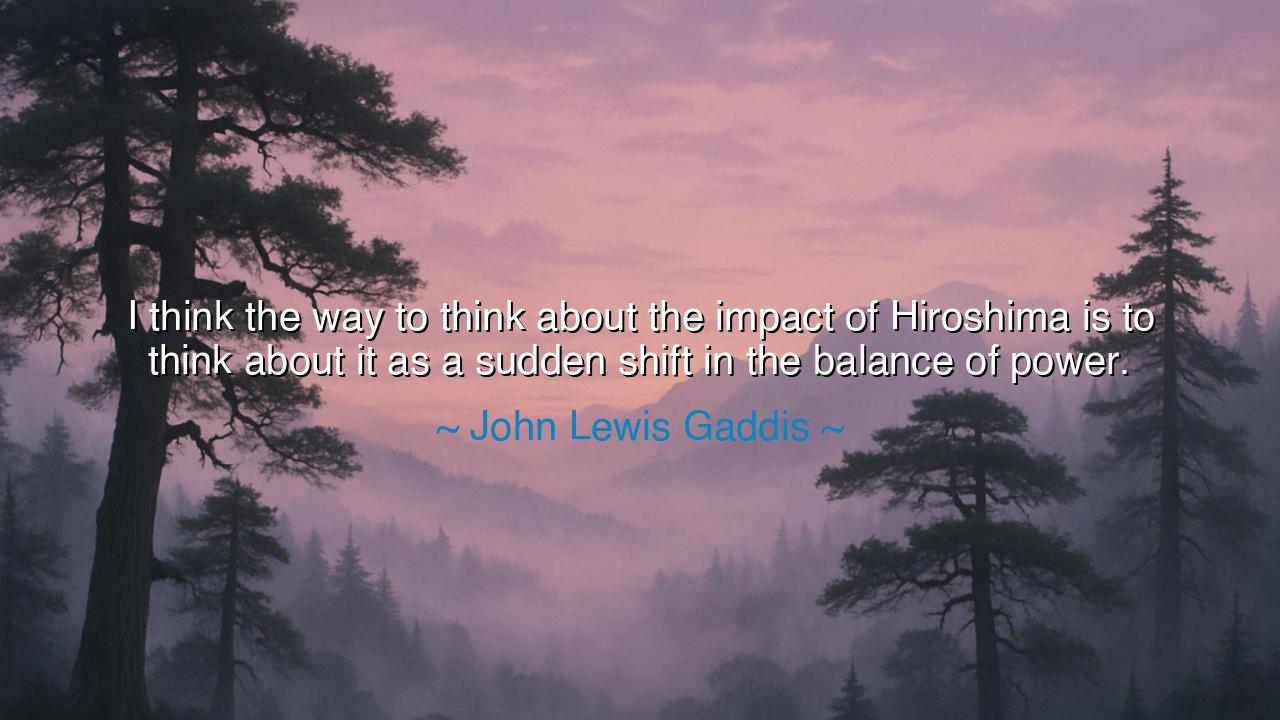
I think the way to think about the impact of Hiroshima is to
I think the way to think about the impact of Hiroshima is to think about it as a sudden shift in the balance of power.






In the words of John Lewis Gaddis—“I think the way to think about the impact of Hiroshima is to think about it as a sudden shift in the balance of power.”—we are reminded of the day when the world was torn from one age into another. The bombing of Hiroshima was not merely an act of war, but the birth of a new reality: a reality in which nations no longer contended only with armies and fleets, but with the terrifying power of the atom. In a single instant, the scales of history tilted, and mankind was forced to reckon with weapons that could annihilate entire cities in a flash.
The ancients, too, knew the terror and awe of sudden transformations. When Alexander the Great cut through the Gordian Knot, he did not merely solve a puzzle—he overturned the very expectations of kingship and conquest. With one stroke, power shifted. So too at Hiroshima: an act meant to end one war also began a new era, when power was redefined not by numbers of soldiers, but by the ability to wield destruction beyond imagination.
The balance of power had always been delicate, but Hiroshima shattered the old order. Empires that once measured their strength in battleships and colonies now faced a weapon that rendered such measures obsolete. The event proclaimed that no fortress, no city, no army could guarantee safety. It was a moment when humanity stood at the threshold of its own fragility, confronted by the knowledge that survival itself could be held hostage by a handful of weapons.
History shows that such shifts are rare but enduring. The discovery of gunpowder in the Middle Ages reshaped the world, ending the age of castles and knights, and birthing empires that spanned oceans. But Hiroshima’s shift was greater still, for it was not merely military—it was existential. For the first time, mankind held in its hands the power of its own extinction. The impact was not only on geopolitics, but on the human soul, which now lived under the shadow of annihilation.
Thus, let us learn: the true meaning of Hiroshima lies not only in its destruction, but in its revelation. Power is fragile, balance is fleeting, and one discovery can overturn the order of the world in a single day. To remember this is to be humbled, for it teaches us that strength without wisdom is peril, and that the survival of nations depends not merely on power, but on the wisdom to wield it with restraint.






APanh phuong
Gaddis' idea of Hiroshima as a dramatic shift in power helps frame the aftermath of the bombing as not just a tragic moment, but a catalyst for global change. What were the longer-term effects on nations' approach to diplomacy, military power, and deterrence? How did the new realities of nuclear power impact international law, and did Hiroshima signal the beginning of a new era of geopolitical tension that still shapes the world today?
GDGold D.dragon
John Lewis Gaddis' perspective on Hiroshima as a key moment that altered the balance of power raises important questions about the role of warfare in shaping political realities. What if the use of atomic bombs had never happened? Would the global balance of power have shifted in a different way? How much does this event, and the power it symbolized, still influence the way we approach international relations today?
TNTruc Nguyen
The notion of Hiroshima as a 'sudden shift in the balance of power' is a stark reminder of how pivotal moments in history can quickly alter the course of global relations. How much of today’s geopolitical tension can be traced back to the atomic age that began with Hiroshima? Could the ensuing arms race and the threat of nuclear warfare be seen as a direct result of that power shift?
AT36. Nguyen Vu Anh Tu
When John Lewis Gaddis frames the impact of Hiroshima as a sudden shift in power, it really makes you think about how moments of extreme violence can reshape global politics. In the case of Hiroshima, it wasn’t just the destruction but the new weaponry it introduced that fundamentally changed the balance of global power. How did this event reshape not only military strategy but also the psyche of global leadership in the post-war world?
GDGold D.dragon
Gaddis’ take on Hiroshima emphasizes its pivotal role in changing the global balance of power. It makes me wonder, was the use of atomic weapons a strategic move, or was it a reflection of a lack of understanding about the long-term consequences? How did this sudden shift in power influence global diplomacy and conflict, and did it pave the way for a more dangerous arms race?